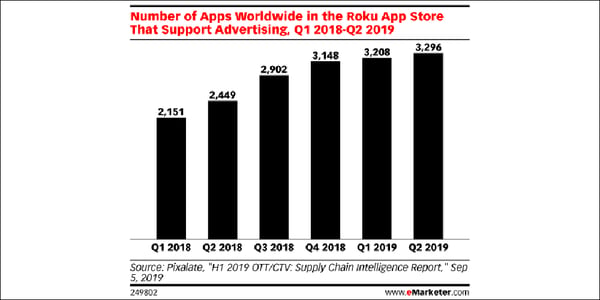
This week's review of ad fraud and quality in the digital advertising space.

eMarketer this week released its Q4 2019 Digital Video Trends report, highlighted by the surging ad spend in OTT and Connected TV (CTV). "Roku keeps expanding its publisher roster: In Q2 2019, there were 3,296 apps in the Roku app store that support advertising, up from 2,449 in Q2 2018, according to ad fraud monitoring vendor Pixalate," wrote eMarketer.
![]()
"The FBI is treating any mobile app that comes out of Russia as a 'potential counterintelligence threat,' the U.S.’s top law enforcement agency said in a letter to Senate Democratic leader Chuck Schumer," reported Bloomberg.

"In a pre-holiday message to consumers, an FBI field office is warning that 'smart TVs' -- televisions equipped with internet streaming and facial recognition capabilities -- may be vulnerable to intrusion," wrote CNN. "In addition to outlining how new advanced technological features risk allowing television manufacturers and app developers to snoop on consumers, the bureau says malicious cyber actors can also take control of unsecured smart TVs and potentially wreak havoc on unsuspecting owners."

"Democratic senators [recently] revealed a new online privacy bill that could mark a milestone in the lengthy push for a federal privacy law," reported CNBC. "The bill would provide protections for digital consumers and establish a new bureau within the Federal Trade Commission to enforce digital privacy rights."

Security Boulevard runs through "the annual holiday cybercrime surge," including a rise in ad fraud. "After attackers have harvested plenty of accounts and start to monetize that with card fraud, they transition their bot activity to another lucrative venue: ad fraud," wrote Security Boulevard. "According to Radware, the onslaught of advertising fraud usually happens right after Cyber Monday. Last year, programmatic advertising vendor Pixalate found that ad fraud increased 24% during the holidays."
*By entering your email address and clicking Subscribe, you are agreeing to our Terms of Use and Privacy Policy.
These Stories on Weekly Recaps
*By entering your email address and clicking Subscribe, you are agreeing to our Terms of Use and Privacy Policy.

Disclaimer: The content of this page reflects Pixalate’s opinions with respect to the factors that Pixalate believes can be useful to the digital media industry. Any proprietary data shared is grounded in Pixalate’s proprietary technology and analytics, which Pixalate is continuously evaluating and updating. Any references to outside sources should not be construed as endorsements. Pixalate’s opinions are just that - opinion, not facts or guarantees.
Per the MRC, “'Fraud' is not intended to represent fraud as defined in various laws, statutes and ordinances or as conventionally used in U.S. Court or other legal proceedings, but rather a custom definition strictly for advertising measurement purposes. Also per the MRC, “‘Invalid Traffic’ is defined generally as traffic that does not meet certain ad serving quality or completeness criteria, or otherwise does not represent legitimate ad traffic that should be included in measurement counts. Among the reasons why ad traffic may be deemed invalid is it is a result of non-human traffic (spiders, bots, etc.), or activity designed to produce fraudulent traffic.”

